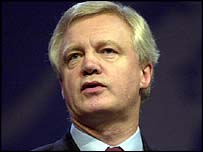|
Analysis
By Nick Assinder
Political Correspondent, BBC News website
|

He may have won the vote, but Tony Blair will not take too much comfort from his victory in the first skirmish over ID cards.

Blair may face trouble ahead
|
His backbench rebels managed to slash his 67 majority to 31 in the first serious challenge to his authority since the general election.
Historically that is a pretty solid result, but it only came amid suggestions that some had kept their powder dry for bigger battles ahead and after Home Secretary Charles Clarke promised to cap the cost of cards.
Even supporters of the proposal, notably former home office minister John Denham, were claiming more people opposed the measure than had voted against it this time around.
And, as the bill entered its long parliamentary process, he predicted ministers would have to make further concessions to get the legislation onto the statute books.
Leading rebel Bob Marshall-Andrews claimed the bill was now heading for defeat.
Civil liberties
The rebels always expected that opposition to the proposal would take time to grow and that, at each stage, the government might be forced to make more concessions, if not actually lose the bill.
They now expect it will get a mauling in the Lords and that opposition amongst MPs and, more crucially, the public, will increase as minds focus on the realities of the measure.
Concerns over civil liberties, the likely cost, reliability and effectiveness of the scheme are all, they believe, likely to grow.

Davis has led Tory opposition
|
One suggestion is that the proposal should not go through the usual parliamentary procedures but be submitted to a special standing committee which could take "evidence" from a wide range of experts before proceeding.
Home Secretary Charles Clarke has not only refused to rule out such a move, but declared he is willing to consider anything.
This may be a tactic designed to reassure MPs that ministers are listening to the concerns, or it may be a recognition that there is serious trouble ahead and movement may be necessary.
 |
HAVE YOUR SAY
 I don't believe we need such an over-priced and unnecessary scheme
I don't believe we need such an over-priced and unnecessary scheme

Bhupinder Kahlon, London, UK
|
Another suggestion is that, before ID cards could be made compulsory, they should have been voluntarily taken up by a significant majority of citizens.
Meanwhile, and not for the first time, some Labour MPs, supporters and union leaders are suggesting that the government has got itself hung up on an issue that is a distraction from what it should really be devoting its energies to - improving public services for example.
And Tony Blair is indeed now facing months of continuing controversy over this measure which, as the first vote showed, is set to cast a long shadow over his final parliament.

~RS~q~RS~~RS~z~RS~23~RS~)